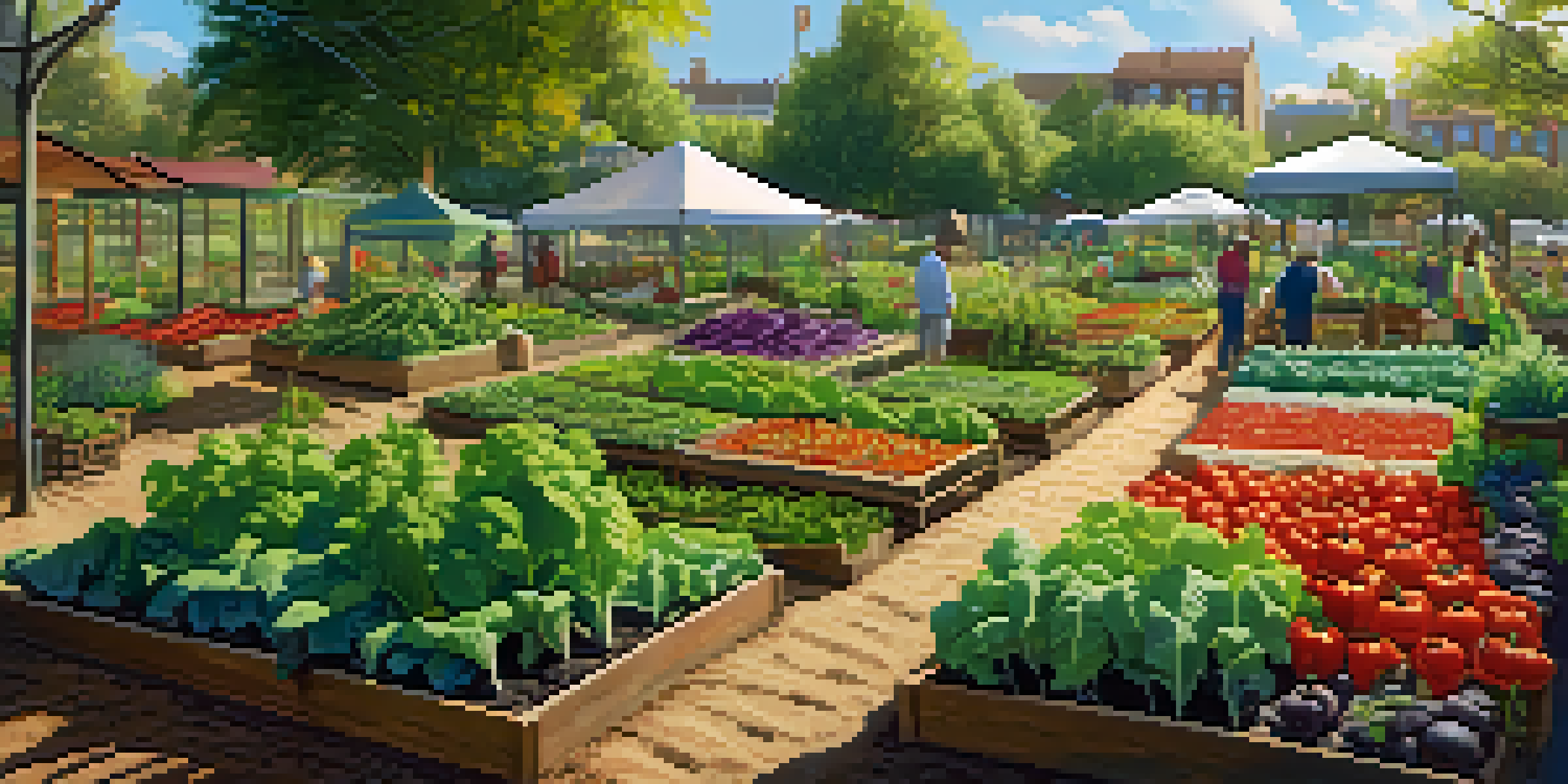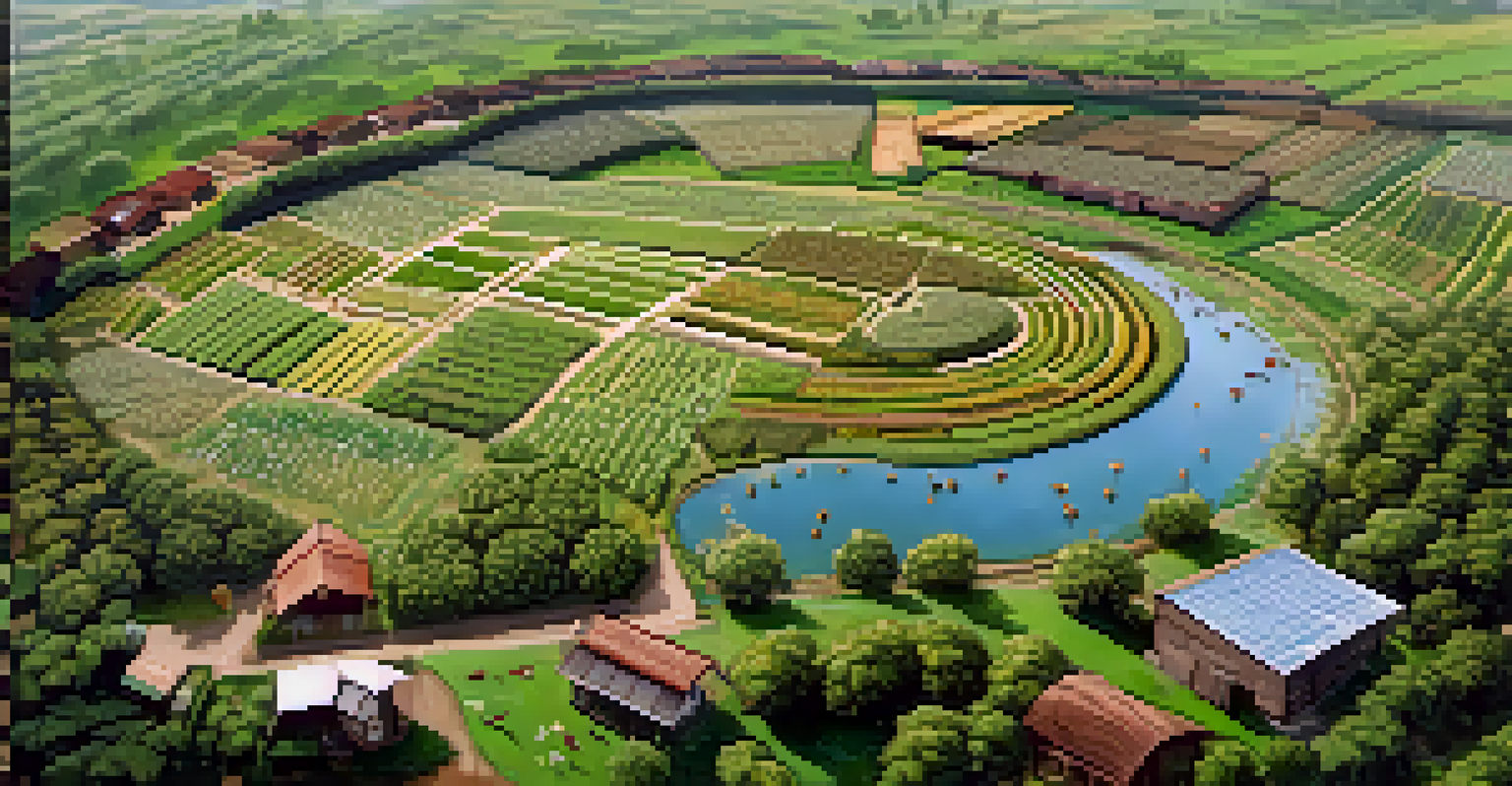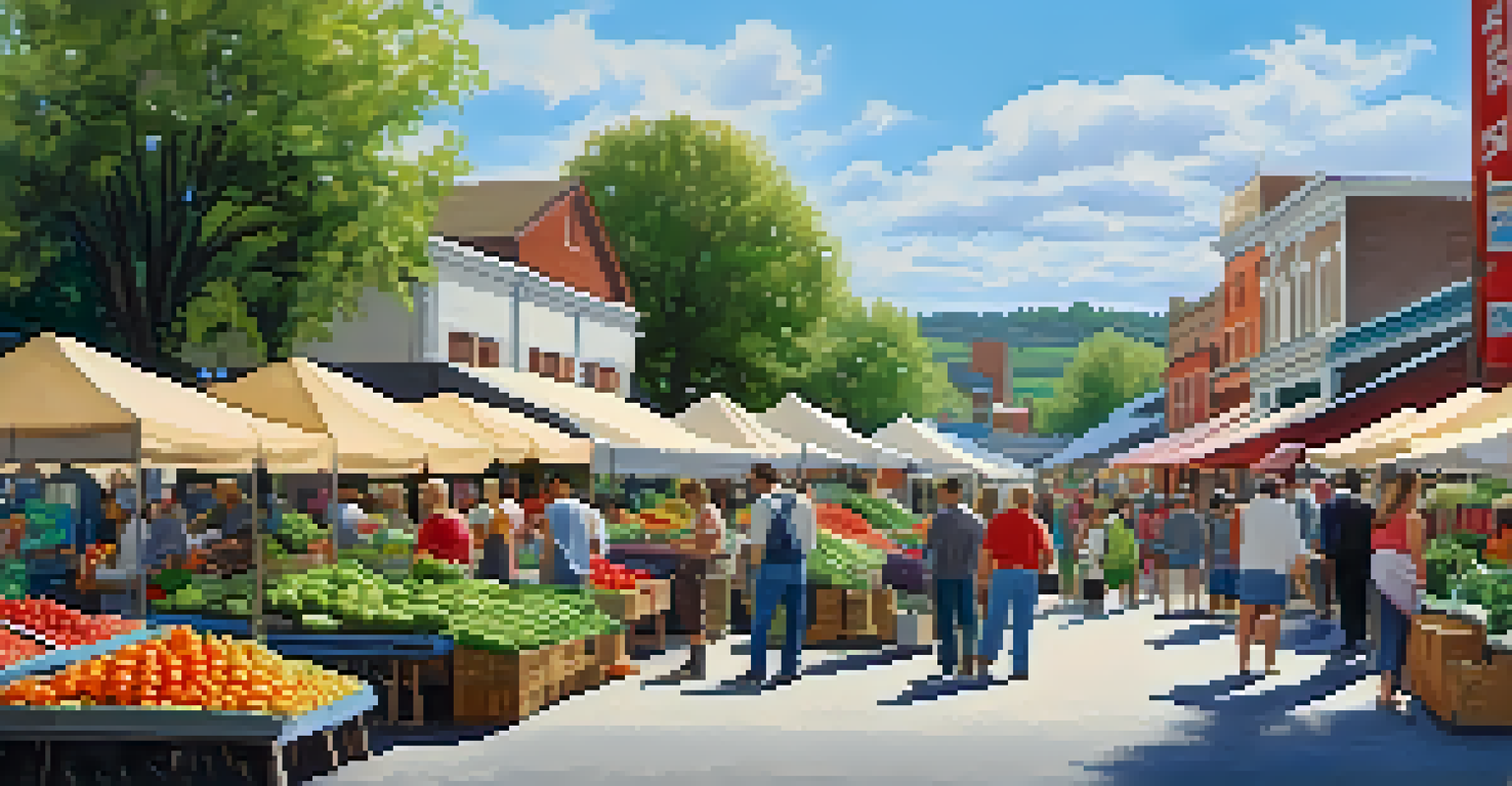Sustainable Farming Practices for Future Vegetarian Foods

Understanding Sustainable Farming: A Holistic Approach
Sustainable farming refers to agricultural methods that prioritize environmental health, economic profitability, and social equity. This holistic approach ensures that farming practices not only meet current needs but also preserve resources for future generations. By focusing on soil health, biodiversity, and ecosystem balance, sustainable farming creates a system that supports diverse vegetarian food options.
The greatest threat to our planet is the belief that someone else will save it.
Imagine a thriving garden where crops flourish without harmful chemicals. This vision is possible through sustainable practices like crop rotation and organic farming, which enhance soil fertility and reduce pests naturally. In essence, sustainable farming embodies a philosophy that nurtures the land, ensuring a rich variety of vegetarian foods for years to come.
Moreover, sustainable farming often emphasizes local food systems, which can significantly reduce carbon footprints. By growing food close to where it’s consumed, communities can enjoy fresher produce while minimizing transportation emissions. This approach not only supports local economies but also fosters a deeper connection between consumers and their food sources.
Crop Rotation: Enhancing Soil Health and Yield
Crop rotation is a time-tested practice where different crops are planted in succession on the same land. This method can significantly improve soil health by preventing nutrient depletion and disrupting pest cycles. For instance, planting legumes after cereal crops can naturally replenish nitrogen in the soil, leading to healthier plants and higher yields.

Think of crop rotation as a farmer's way of giving their fields a well-deserved break. Just as we need to rest to perform at our best, soil benefits from a varied diet of crops. This practice not only enhances soil fertility but also reduces the need for synthetic fertilizers, making it an eco-friendly choice for sustainable farming.
Sustainable Farming Benefits Everyone
Sustainable farming practices prioritize environmental health, economic viability, and social equity, ensuring a better future for both communities and the planet.
Incorporating crop rotation into sustainable farming not only supports varied vegetarian diets but also contributes to food security. By diversifying crops, farmers can adapt to changing climate conditions and market demands, ensuring a steady supply of nutritious vegetarian options for consumers.
Permaculture: Designing Sustainable Ecosystems
Permaculture is an innovative approach that combines agriculture with ecology to create self-sustaining systems. By mimicking natural ecosystems, permaculture promotes biodiversity and reduces reliance on external inputs like pesticides and fertilizers. This method is especially beneficial for vegetarian farming, as it allows for a wide range of crops to thrive together.
Sustainable agriculture is not just a way of farming; it is a way of thinking about how we can meet our needs without compromising the ability of future generations to meet theirs.
Imagine a garden where plants, animals, and insects coexist harmoniously, each playing a vital role in the ecosystem. This is the essence of permaculture, where everything is interconnected. For example, planting nitrogen-fixing plants alongside fruit-bearing trees can enhance overall productivity while supporting biodiversity.
By adopting permaculture principles, farmers can create resilient systems that adapt to environmental changes. This not only leads to a sustainable supply of vegetarian foods but also fosters a deeper appreciation for nature's intricate balance, encouraging consumers to support eco-friendly farming practices.
Organic Farming: Growing Without Harmful Chemicals
Organic farming focuses on growing crops without synthetic pesticides or fertilizers, prioritizing natural methods to manage pests and soil health. This practice not only protects the environment but also ensures that the food produced is free from harmful residues. For many consumers, choosing organic vegetarian foods means embracing healthier choices for themselves and the planet.
Think of organic farming as a return to simpler times when farmers relied on nature's wisdom. Techniques like composting, crop rotation, and natural pest control become central to this method, creating a more balanced ecosystem. For example, introducing beneficial insects can help manage pest populations without chemicals, resulting in healthier crops.
Crop Rotation Boosts Soil Health
Implementing crop rotation enhances soil fertility and reduces the need for synthetic fertilizers, supporting both healthier crops and sustainable farming.
As demand for organic produce continues to rise, sustainable farming practices like organic agriculture play a crucial role in meeting consumer needs. By choosing organic vegetarian foods, individuals support practices that enhance soil health, protect biodiversity, and foster a more sustainable food system.
Agroforestry: Integrating Trees into Farming Systems
Agroforestry combines agriculture and forestry practices to create more sustainable land-use systems. By integrating trees with crops and livestock, farmers can enhance biodiversity, improve soil health, and increase resilience to climate change. This method not only supports a variety of vegetarian foods but also contributes to carbon sequestration.
Picture a farm where fruit trees provide shade for crops and habitats for wildlife. This is the beauty of agroforestry, where trees play a multifaceted role in the ecosystem. For instance, tree roots can help prevent soil erosion while providing organic matter that enriches the soil, leading to healthier crops.
The benefits of agroforestry extend beyond the farm, as these systems can improve water quality and enhance resilience against extreme weather. By adopting agroforestry practices, farmers can create sustainable landscapes that support diverse vegetarian diets while contributing to a healthier planet.
Water Management: Essential for Sustainable Agriculture
Effective water management is crucial for sustainable farming, especially in the face of climate change. Techniques like rainwater harvesting, drip irrigation, and mulching help conserve water while ensuring crops receive adequate moisture. By implementing these practices, farmers can maintain productivity while minimizing water waste.
Think of water management as a farmer’s way of creating a reliable water supply, much like a savings account for crops. For example, drip irrigation delivers water directly to plant roots, reducing evaporation and runoff. This focused approach not only conserves water but also promotes healthier plants, leading to better yields.
Community Supported Agriculture Grows Bonds
Community Supported Agriculture (CSA) fosters direct connections between consumers and local farms, promoting sustainable practices and seasonal produce.
As the demand for vegetarian foods grows, sustainable water management practices will be essential. By adopting innovative techniques, farmers can ensure that they have the resources needed to cultivate diverse crops while supporting the health of local ecosystems.
Community Supported Agriculture: Building Local Connections
Community Supported Agriculture (CSA) allows consumers to buy shares of a farm's harvest, fostering a direct connection between farmers and their community. This model supports sustainable farming by providing farmers with upfront capital while encouraging consumers to invest in local, seasonal produce. It’s a win-win for everyone involved!
Imagine receiving a box of fresh, seasonal vegetables from a local farm each week. This is the joy of participating in a CSA. Members not only enjoy fresh produce but also gain insight into sustainable farming practices, enhancing their appreciation for where their food comes from.

By supporting CSA programs, consumers can help sustain local farmers while promoting eco-friendly practices. This relationship strengthens community ties and encourages a more sustainable food system, paving the way for a future rich in vegetarian options.
The Future of Vegetarian Foods: A Sustainable Vision
As awareness of environmental issues grows, the future of vegetarian foods depends heavily on sustainable farming practices. By embracing methods like crop rotation, permaculture, and organic farming, we can cultivate a food system that nourishes both people and the planet. This vision not only addresses food security but also promotes health and well-being.
Consider the potential of a future where every meal is sourced from sustainable farms. This not only reduces our ecological footprint but also enhances our relationship with food. Imagine vibrant communities that prioritize local, seasonal vegetarian options, creating a thriving ecosystem for both farmers and consumers.
Ultimately, the path to a sustainable future is paved with choices that reflect our values. By supporting sustainable farming practices, we can ensure that future generations enjoy a diverse array of vegetarian foods, contributing to a healthier planet and a more sustainable food system.